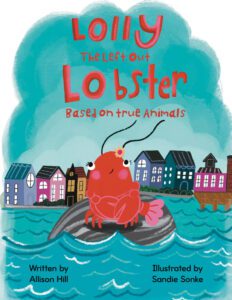Family lore leads to kids’ book on inclusion!
Though she grew up in South Florida, Allison Hill had parents who regularly took her back to their roots in New England. It was there she first heard her dad tell a story about a lobster lost in the woods. On a family vacation to Maine last year, the tale got Hill thinking.

What if a lobster did live in the woods? How did it get there? Would it have friends? How would it get home? Did it miss its family? The answers spilled out in rhyme, and in just a day, Hill had the basis for the children’s book Lolly the Left Out Lobster that published in May.
“After that first draft, I refined it, and then I was brave enough to read it out loud to my kids,” says the Buckhead resident who has two young adult daughters. “They advised me to keep it really simple.”
Lolly’s story is more than a simple kids’ book; it has a direct message about themes Hill encounters daily as an executive at a private equity firm where she collaborates with nonprofits, employees and other audiences on diversity and inclusion initiatives. Those ideas are also central to the nonprofit Eat Laugh Give that she launched in 2022 to support families experiencing food shortages. Proceeds from the book support those efforts.
“People have very different views of what diversity and inclusion mean,” Hill says. “For me, it starts with having an open heart and open mind, and especially having that message for kids as you’re raising them.”
With Lolly, Hill had the chance to share that message and fulfill a dream. “I’ve wanted to write a kids’ book for years, and I tried for years,” she says. “I’ve always loved creativity, be it cooking, writing or decorating. Those things are soothing and relaxing to me.”
The book has a simple message: Approach others with kindness and without judgment. The story, along with the rhymes and colorful illustrations, have resonated with readers, too, especially kids from 3 to 6, and even older. For adults, the book also includes several tips on how to talk to kids about feeling left out and helping others who might feel excluded.
“I’ve done book readings at schools and summer camps, and I always ask who’s felt left out,” Hill says. “We talk about being open to new friends, new experiences. And I point out that even though Lolly is a scary little lobster, she’s very kind. By the end of the reading, they’re all making lobster claws with their hands.”
Occasionally, a kid will provide an unexpected surprise, Hill says. A reading she gave at an Atlanta charter school ended with one little girl whispering that—shock!—her sister eats lobsters.
“I didn’t know what to say, so I just gave her a little hug,” Hill says with a laugh. “But it was still a big confidence booster.”
eatlaughgive.com
@eatlaughgive
Atlanta-based writer and editor contributing to a number of local and state-wide publications. Instructor in Georgia State’s Communication department and Emory’s Continuing Education division.












